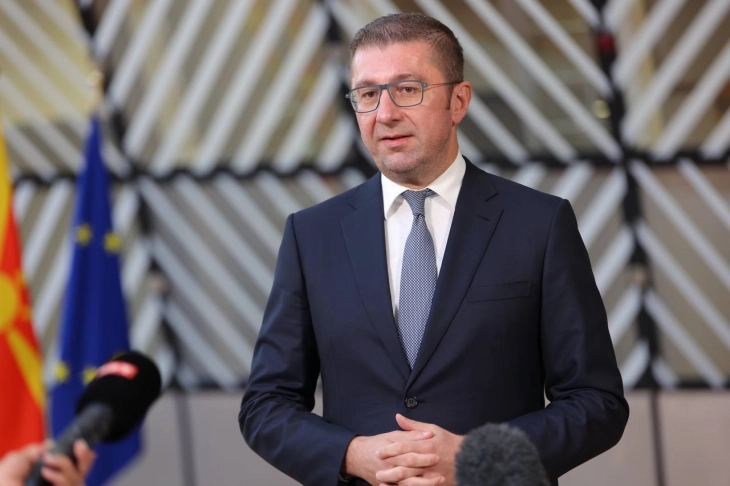Mickoski in Brussels: Process of EU integration should be based on achievements, not bilateral issues
- The process of integration with the European Union should be based on achievements and not on bilateralization, i.e. bilateral issues, Prime Minister Hristijan Mickoski said in Brussels on Thursday, stressing that he reiterated at the meetings that "we can no longer accept ultimatums and for us, the principle of 'they are there, you are not' is not acceptable", as well as that "we remain focused on proposing solutions, and if there really is a will, then there is a way".

Brussels, 19 September 2024 (MIA) - The process of integration with the European Union should be based on achievements and not on bilateralization, i.e. bilateral issues, Prime Minister Hristijan Mickoski said in Brussels on Thursday, stressing that he reiterated at the meetings that "we can no longer accept ultimatums and for us, the principle of 'they are there, you are not' is not acceptable", as well as that "we remain focused on proposing solutions, and if there really is a will, then there is a way".
Mickoski, who attended Thursday the working lunch hosted by European Commission President, Ursula von der Leyen, together with the other Western Balkan leaders, and also met with European Council President, Charles Michel, said "it is normal that those meetings discuss the European perspective of the region, as well as the European perspective of Macedonia as a country".
"What I could say there is that the process of integration within the European Union, both for us and for the region, must be based on a process that will evaluate achievements, and not bilateralization, i.e. bilateral issues, as a decisive factor," Mickoski pointed out.

Unfortunately, Mickoski continued, even two and a half decades since we started the integration process, since we signed the Stabilization and Association Agreement, we are victims of bilateral issues, i.e. of bilateralization of the pre-accession process.
"And what I said there is that we are now struggling to start negotiations in which we will strengthen the institutions and enrich the capacities. We are not talking about full-fledged European Union membership. Due to bilateral issues, due to issues of the Middle Ages, we cannot develop as a country of the 21st, 22nd century, let alone talk about something more. So, I emphasized once again that we can no longer accept ultimatums and for us, the principle of 'they are there, you are not, if you want to be there, you have to accept that', forgive me, but we cannot accept such a thing. On the other hand, they tell us that there is a will to be, as a country, a member of the European Union. My response to that thesis is - if there's a will, there's a way," said Mickoski.
We are here, Mickoski pointed out, to be constructive, to remain focused on fulfilling this strategic goal. "We remain focused on proposing solutions, and if there really is a will, then there is a way," he said.
Mickoski, among other things, said that during the lunch one of the attendees said that sacrifices need to be made in the process of integrating the region with the European Union, to which he has noted that making a sacrifice might even be a good word for us and a politically correct word, because we have been the victim of many humiliations in the past.
"Sacrifice is something else. But we were humiliated many times. I will remind you that in the name of European values, we changed the flag, we changed banknotes, we changed the Constitution several times, we changed the name, we have done a lot of things to show that we really want to be part of the European family. And when someone tells me "but that's the rule of unanimity", please, that is an ultimatum. It's not the European values that my generation fell in love with. I am ready to talk to anyone, as much as it is necessary, to literally talk to anyone until we find the right way, which will not be humiliating this time. To allow us to strengthen our institutions and enrich our capacities as a country, that is what I am asking for. Is it much to ask for? I don't think it is," Mickoski said.
Photo: Government







